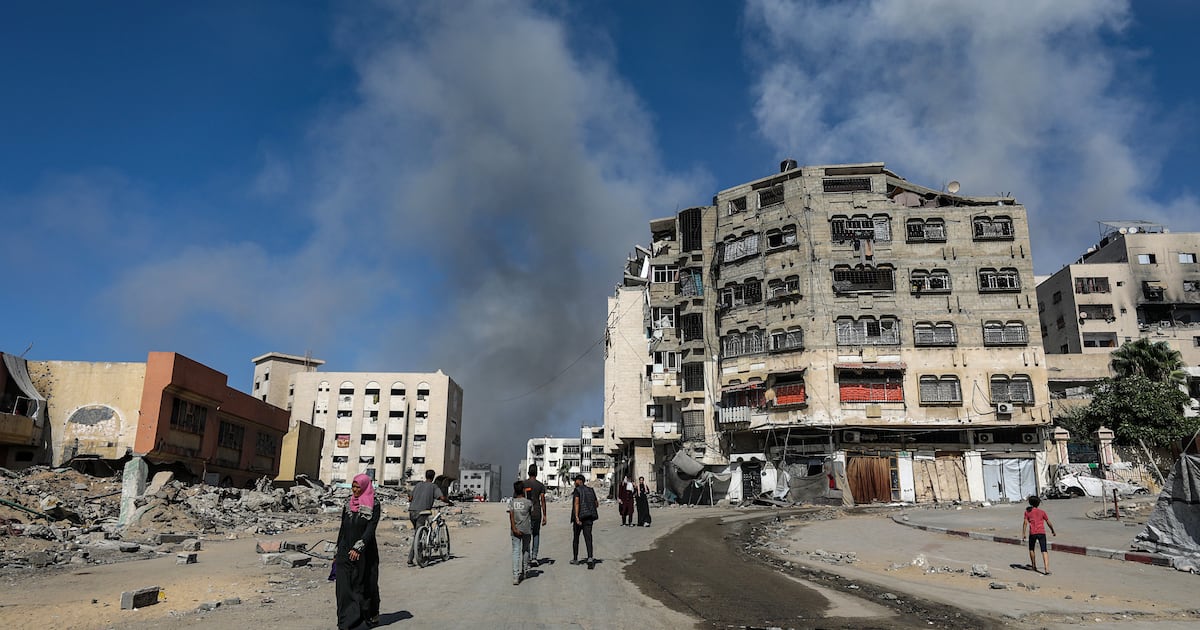Hamas said on Friday it would agree to some aspects of US president Donald Trump’s plan to end the Gaza war, including releasing hostages, but avoided addressing more vexing issues like disarmament and said it would seek further negotiations.
In a copy of the statement seen by Reuters news agency, Hamas issued its response to Mr Trump’s 20-point plan after the US president gave the Palestinian militant group until Sunday to accept or reject the proposal.
It was unclear if the US or Israel would be willing to engage in further negotiations on the plan’s terms.
Hamas did not say if it would agree to disarm and demilitarise Gaza – something Israel and the US want but Hamas has rejected before. It also did not agree to an Israeli withdrawal in stages, as opposed to the immediate, full withdrawal Hamas demands.
The White House did not immediately respond to a request for comment. Earlier on Friday it had urged Hamas to accept the proposal or face grave consequences. There was also no immediate comment from Israel, which backs the proposal.
A senior Hamas official told Al Jazeera that the group would not disarm before Israel’s occupation of the enclave ends, comments that underscored the gap between the parties as the war approaches its two-year mark.
In response to Mr Trump’s plan, Hamas said it “appreciates the Arab, Islamic, and international efforts, as well as the efforts of US president Donald Trump, calling for an end to the war on the Gaza Strip, the exchange of prisoners, [and] the immediate entry of aid,” among other terms.
It said it was announcing its “approval of releasing all occupation prisoners – both living and remains – according to the exchange formula contained in Mr Trump’s proposal, with the necessary field conditions for implementing the exchange.”
But Hamas added: “In this context, the movement affirms its readiness to immediately enter, through the mediators, into negotiations to discuss the details.”
The group said it was ready “to hand over the administration of the Gaza Strip to a Palestinian body of independents [technocrats] based on Palestinian national consensus and supported by Arab and Islamic backing.”
Hamas has previously offered to release all hostages and to hand over administration of the Gaza Strip to a different body.
Mr Trump’s plan specifies an immediate ceasefire, an exchange of all hostages held by Hamas for Palestinian prisoners held by Israel, a staged Israeli withdrawal from Gaza, the disarmament of Hamas and the introduction of a transitional government led by an international body.
On Friday, Mr Trump said in a social media post that an agreement must be reached by 6pm on Sunday, Washington DC time (11pm Irish time).
“If this last chance agreement is not reached, all hell, like no one has ever seen before, will break out against Hamas,” Mr Trump said.
After presenting his plan to Arab and Muslim nations last week, Mr Trump hosted Israeli prime minister Binyamin Netanyahu at the White House where the Israeli prime minister endorsed the document, saying it satisfied Israel’s war aims.
Hamas was not involved in the negotiations that led to the proposal, which calls on the Islamist militant group to disarm, a demand it has previously rejected.
Egypt, Qatar and Turkey have been holding talks with Hamas leaders in Doha about the plan, reportedly exerting pressure for a response that would lead to an end to the war. They wanted Hamas to show flexibility and limit its objections.
According to Arab diplomatic sources, the three countries were working to prevent Hamas from rejecting the initiative outright, a move they believe would trigger harsher Israeli military action and deepen the humanitarian crisis.
[ Hamas weighs Trump peace plan as other Palestinian factions reject itOpens in new window ]
 Donald Trump: ‘If this last chance agreement is not reached, all hell, like no one has ever seen before, will break out against Hamas.’ Photograph: Leon Neal/ PA Wire
Donald Trump: ‘If this last chance agreement is not reached, all hell, like no one has ever seen before, will break out against Hamas.’ Photograph: Leon Neal/ PA Wire
Hamas’s greatest fear is that the Israel will renew attacks once the hostages are released, even if there were international guarantees in place to thwart such a scenario.
Throughout the war, campaigners in Israel calling for the release of the hostages have urged their government to accept any deal that brings the hostages home, arguing that if need be, Israel will find an excuse afterwards to renew hostilities. Hamas is attentive to these voices, which fuel their mistrust over Israeli intentions.
Israel began its offensive in Gaza after the October 7th, 2023, Hamas-led attack on Israel in which some 1,200 people were killed and 251 taken as hostages back to Gaza, according to Israeli tallies. Israel says 48 hostages remain, 20 of whom are alive. Israel’s military campaign has killed more than 66,000 people in Gaza, most of them civilians, according to Gaza health authorities.- Additional reporting: Reuters
[ What’s in Trump’s 20-point peace plan for Gaza, and will Hamas accept it?Opens in new window ]

